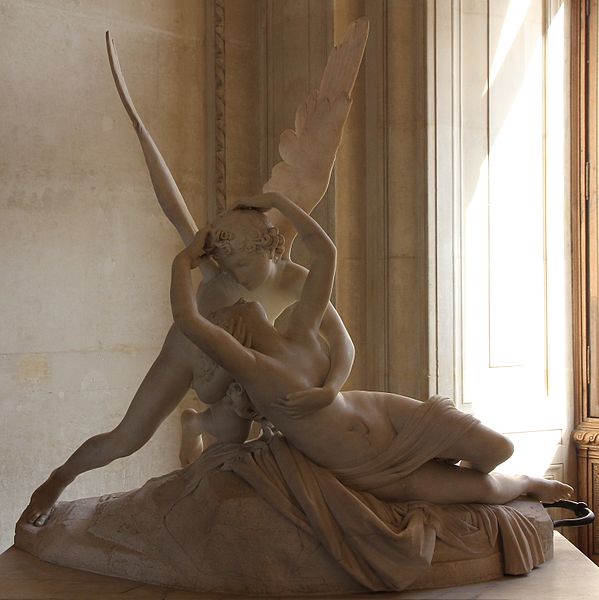
Amor (Cupid) kisses Psyche by Antonio Canova, Louvre. Photo by Jörg Bittner Unna via Creative Commons.
Define "great"
by Tom Sullivan
Amor (Cupid) kisses Psyche by Antonio Canova, Louvre. Photo by Jörg Bittner Unna via Creative Commons.
When Barack Obama ran for president "hope" became his watchword. For Donald Trump, it was "great." The terms were vague enough that fans could impress on them anything their hearts desired. Many dreamed bigger than their leaders could deliver are would/will be disappointed.
As to a country's greatness, that is probably in the eye of the beholder, at least over the short term. But in historical terms, greatness has more to do with positive achievements and cultural legacy: legal, mathematical, social, scientific, artistic. It's hard to imagine anything like that coming out of the current crop of know-nothing nihilists running amuck at 1600 Pennsylvania Avenue.
A young coworker expressed a desire this week to visit the Louvre Museum. She can't pronounce it well, but she knows what it is, knows it is in France, and feels is is important that she go. The sitting U.S. president this week visited the Smithsonian's National Museum of African American History and Culture and declared slavery "just not good." He told the press he loathes:
"Today and every day of my presidency I pledge to do everything I can to continue that promise of freedom for African-Americans and for every American," Trump said, calling his tour "a meaningful reminder of why we have to fight bigotry and hatred and intolerance."(The Management hopes you weren't reading that with a mouthful of coffee.)
... knowledge is not a useful tool but a cunning barrier elites have created to keep power from the average man and woman. The same is true for experience, skills, and know-how. These things require time and work and study and often challenge our systems of belief. Truth is hard; shallowness is easy.If this is greatness, it is not the kind lovingly preserved in museums as a cultural legacy. If this is greatness, it will not produce classic works of art treasured for celebrating "What a piece of work is a man!"
Art is not an adornment to society. It is not a luxury. It is the purpose of society. It becomes our legacy. It is also, however, our teacher; it helps us consider that which is around us and what we want to be. It makes demands on us that in turn lead us to place demands on ourselves and those with whom we live and work. And that is precisely why these programs have been targeted by Trump. They are the enemies of the shallow state. So, too, of course, are the members of the press whom Trump has mislabeled as “enemies of the people.” The only people they are the enemy of are those who are at war with truth and thought: Trump and his supporters, the champions of the shallow state. That is why, while it is easy to simply be angry or to laugh at a president who doesn’t read or to be distracted by half-baked conspiracy theories like the deep state, we must recognize that the shallow state is much more pernicious. This administration has come to power because America has allowed public discourse, the quality of education we give our kids, and the standards we set for ourselves to decline. Trump seeks to institutionalize that decline. He is at war with that which has made our society great. He seeks to eviscerate the elements of our government and discredit those within our society who are champions of the depth on which any civilization depends.But art is challenging and being challenged is taxing and taxing is "just not good." The great societies of the past have nothing to fear.